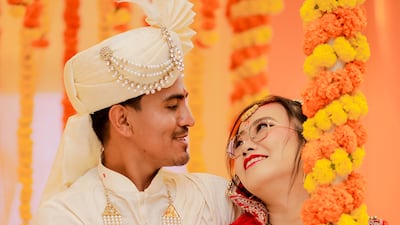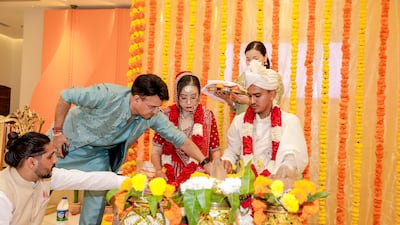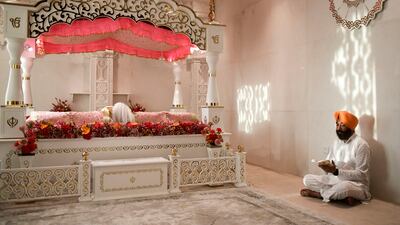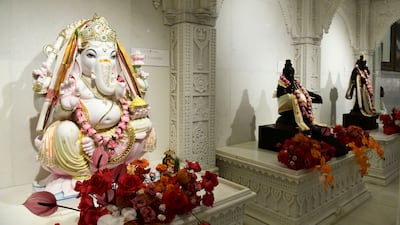Dubai's Hindu temple has recorded more than 1.6 million visits in its first year – as worshippers from all faiths and nationalities unite under one roof.
The white-tiled building with brass spires in the Jebel Ali neighbourhood is a vibrant hub for prayers and colourful community gatherings.
Newborns have been brought to the temple for blessings and residents have celebrated the birthday of elderly parents there.
Open to all faiths, the temple has also welcomed people from different countries, including Ukraine, China, Sri Lanka and Colombia, who chose it as the venue for a traditional Indian marriage ceremony.
The temple first opened its doors in August 2022, before holding a grand official opening ceremony in October.
an Indian engineer who married a Chinese national in the Dubai Hindu temple
“It was a moving experience to get married at this beautiful temple,” said Hilda Zhang, a Chinese national who exchanged vows and garlands with Indian citizen Suraj Negi.
“I have been to India and I think this temple is even more beautiful than some I have seen there.”
Blessed by the gods
Ms Zhang, overseas coordinator for a retail and hospitality company, and her partner were among 18 couples who have exchanged wedding vows in the temple since January.
Couples often complete the civil marriage formalities at courts such as the Abu Dhabi Civil Family Court before booking the temple for a wedding ceremony.
Priests from different Indian states speak in English or regional languages as they explain the rituals that can last up to four hours.

“This temple in Dubai is where Suraj finds his inner peace and I was happy to have the ceremony there,” said Beijing-born Ms Zhang, who is an atheist.
“I found the vows very interesting because Suraj was asked to promise he would respect me, consult me for big financial decisions and treat my parents as he would treat his.”
Mr Negi, a civil engineer from Uttarakhand in northern India, said the temple wedding made him feel blessed.
“Dubai will always have a lifelong space in my heart, it is the place I got married and I will cherish this forever,” he said.
“I wanted a peaceful place where I could hear chanting of priests.
“Getting married in the presence of my gods and in their home was a big factor for me.”
Thousands flock to temple each day
Temple authorities said the site draws more than 20,000 visitors a day for festivals and national holidays.
The busiest month was October last year when numbers soared to more than 245,000 people for the Diwali, festival of lights, and Dusshera celebrations that mark the triumph of good over evil.
Watching people stream into the temple fills the organisers with a sense of pride.

“The thought that so many people come under one roof in a peaceful environment is an amazing feeling,” said Raju Shroff, trustee of the Sindhi Guru Darbar temple that oversaw construction.
“I get a real sense of happiness to see so many people praying, meditating and finding solace here.”
Apart from prayer services and family celebrations, space is set aside to teach children the Sanskrit language, classical music and holy scriptures. There are also plans for outreach programmes to support workers and people in need.
“At the moment we have the prayer, community and knowledge halls. We also want to be a platform to connect people in need with our devotees,” Mr Shroff said.
“When people are stuck in a crisis and request help, they can get assistance from lawyers, doctors. Our devotees want to give food, medical and legal advice so people in need can benefit.”
The temple also runs a kitchen that can cater to about 180 guests.
From simple meals served on banana tree leaves to menus with 45 options, the halls are booked for special prayers and colourful Indian festivals such as Holi and Navratri.
“Some people want to follow exact rituals from back home in India, others ask for additions to the food menu,” said N Mohan, the temple’s general manager.
“We try to adapt to the family’s requirements. People are far away from home and want to celebrate in a place they find joy in.”













